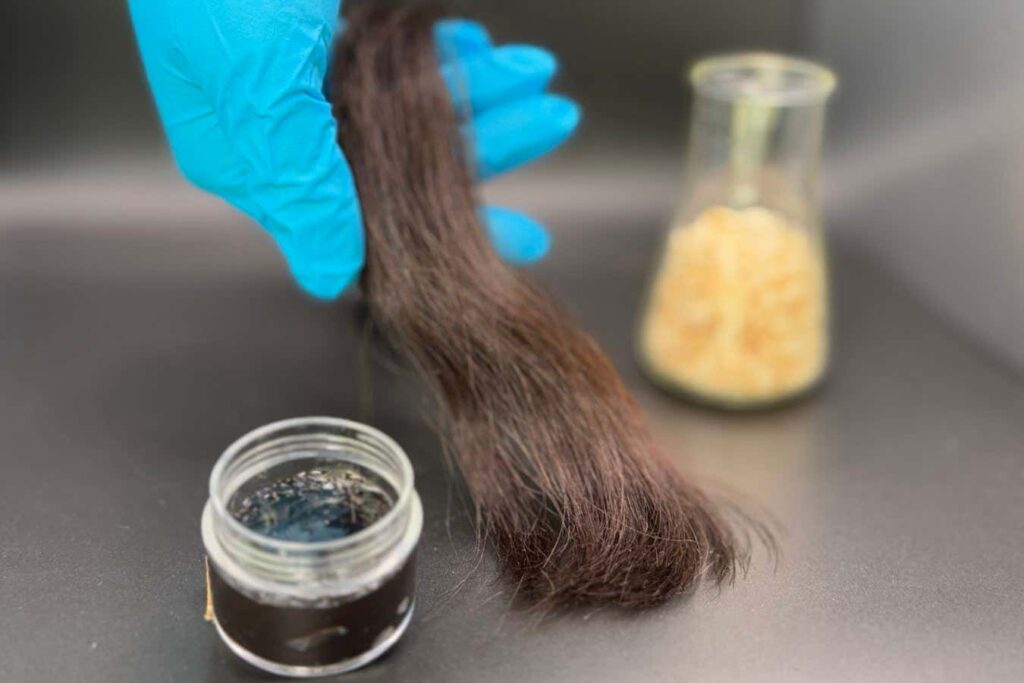The black hair conditioner on the left is derived from the wood powder on the right
Fengyang Wang/Stockholm University
This sustainable, wood-based hair conditioner may be pitch black and smell like peat, but its creators claim it could be the future of haircare after tests suggest it may work just as well as commercial products.
“We are using the power of nature,” says Ievgen Pylypchuk at Stockholm University in Sweden. “We combine a high level of science with old traditions… [to] get something really cool: simple, useful and quite effective.”
Pylypchuk and his colleagues used lignin, a polymer that is a central component of wood and bark, as the starting point for their bio-based conditioner. When extracted from wood, lignin naturally interacts with water while also acting as a surfactant, a key component of detergents. It also contains natural antioxidants, which help to preserve the conditioner, and provides UV protection, says Pylypchuk. “Lignin serves as a multifunctional platform in this context,” he says. “It protects against UV, it is moisturising.”
The researchers combined a lignin gel developed in their laboratory with coconut oil and water to make the end product. Team member Mika Sipponen, also at Stockholm University, claims it works almost as well as commercial conditioners. When used on samples of wetted bleached human hair and then washed out, it reduced the “drag” when combing the hair while it was still damp by 13 per cent, compared with the commercial product they tested, which reduced drag by 20 per cent.
One potential downside is that the current formulation of the conditioner is “pitch black” and smells like “cooked wood”, similar to peat, says Sipponen. That hasn’t deterred the researchers from contemplating commercialising it. They tested the formula on hair, towels and pig skin, and say it washes off without leaving stains. Even the smell is quite pleasant, says Pylypchuk. “I personally like it very much, and most of the people in our lab – maybe because they work with lignin – they liked it.”
Pylypchuk and Sipponen have a patent for the lignin gel and hope their conditioner can become a consumer product, offering people a more sustainable alternative to current products that rely on ingredients derived from fossil fuels. They say the next step is to see if it causes eye and skin irritation ahead of any trial on living hair.
But US-based cosmetics researcher Trefor Evans, formerly at the Textile Research Institute Princeton, New Jersey, has doubts about how well the product would perform compared with commercial rivals. “I’ve been doing these experiments for 30 years, and a conventional conditioner product will lower the combing forces by 80 per cent, maybe even 90 per cent,” he says. Sipponen thinks variation in the testing methods and condition of the hair under analysis could explain why his team only found a 20 per cent reduction for the commercial conditioner.
The wood-based conditioner’s appearance and unusual smell may also put consumers off, says Evans. “The patent literature is absolutely chock-a-block with potential hair conditioner formulas that never went anywhere,” he says. “And the reason is because you don’t just need efficacy – for the consumer to buy it, what you really need as well is aesthetics.”
So, would a black, wood-smelling, eco-friendly conditioner be a hit with consumers? “Sounds like a bit of a non-starter,” says Evans.
Topics:

